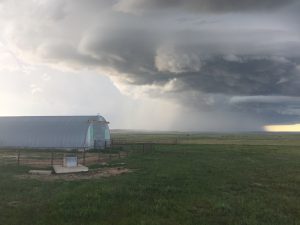Ecologists have long focused on understanding the patterns and drivers of primary production across diverse terrestrial ecosystems as it serves as the foundation of ecosystems and food webs worldwide, drives global carbon cycling, and is an important provisioning resource. However, the vast majority of these cross-site syntheses have been done in natural, unmanaged systems (e.g., LTER) with considerably less attention paid to managed ecosystems (e.g., rangelands, croplands), despite their proportionally larger extent of the global landscape and crucial

An extreme ‘deluge’ approaches the shortgrass prairie of Colorado. Photo by David Hoover
role in feeding and clothing the human population. Here we propose to combine LTER data with two other prominent research networks – the Nutrient Network (NutNet) and the Long-Term Agricultural Research Network (LTAR) – to capture land uses underrepresented by the LTER network and examine the effects of management and climate on production resilience. We have assembled a diverse, working group with expertise in resilience theory, climate change, ecosystem ecology, and sustainable agriculture, spanning a variety of career stages and institutions, to accomplish this novel synthesis. Results from this effort will broaden ecological theory with important implications for land use decisions and global carbon cycle modeling.